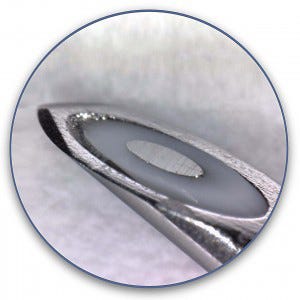September 14, 2016
Researchers create a new smart needle technology equipped with electrodes that can guide physicians to specific areas of the body, and send alerts when the needle approaches sensitive nerves.
Kristopher Sturgis
 A new tool, known as the Injeq IQ-Needle, has been developed by researchers at Tampere University Hospital in Finland to help doctors locate and draw spinal fluid from patients without damaging the delicate surrounding tissue, according to GE Reports.
A new tool, known as the Injeq IQ-Needle, has been developed by researchers at Tampere University Hospital in Finland to help doctors locate and draw spinal fluid from patients without damaging the delicate surrounding tissue, according to GE Reports.
The device was designed to provide a novel tool for use on infants suffering from neonatal meningitis, a condition that has become one of the leading causes of infant mortality in the western world.
For tiny infants, collecting spinal fluid is the most efficient way to obtain an early diagnosis for neonatal meningitis, but the procedure can be as difficult as it is dangerous. Typically doctors will use computer tomography or ultrasound to help guide the needle in lumbar puncture procedures, but neither scan is perfectly accurate, which can lead to additional procedures and punctures.
This new technology comes equipped with electrodes that can guide physicians to the appropriate spot, and send an alert when the tip of the needle contacts the spinal fluid. It can also alert the physician if the needle comes close to any sensitive nerves in the surrounding area -- providing doctors with a tool that is both safer and more accurate. Injeq, the Finnish medical device startup company that developed the technology, recently partnered with GE to further the technology, and create other tissue-identifying needles for spinal taps and cancer biopsies.
"The most urgent clinical need is in neonatal puncture," Injeq CEO Kai Kronström told GE Reports this week. "The study is in its early stage, but everything looks good so far."
Smart needle solutions have become a recent novel solution for physicians to help ensure patient safety and improve needle puncture procedures. Over the summer, Graham Reynolds, vice president of pharmaceutical delivery systems at West Pharmaceutical Services Inc., said that there are a variety of new smart needles and syringes on the horizon. These smart needle and syringe technologies will not only make puncture procedures safer, but should also improve the accuracy and efficiency of procedures going forward.
Kronström also noted that traditional needle procedures that use computer tomography to guide the needle involves exposing the patient to radiation, and can also result in false negatives--which can require patients to repeat the procedure. These kinds of delays can put off cancer treatments for weeks, and can require patients to remain in the hospital due to risks associated with the procedure if the surrounding tissue becomes damaged or bleeds.
Ultimately Kronström and his colleagues hope that this new technology can help eliminate most of these risks, and improve the entire diagnostic process. He even says the technology can be refined to help identify the presence of tumors in real time in other places like the liver. Eventually, the smart needle technology could be used to replace things like computer tomography scans and act as a complementary tool along with ultrasound technologies.
As they move forward with their research, the group hopes to continue to explore the technology as a means to identify the nature of tissues during puncture procedures, and provide diagnostic results in real time. In time, the Injeq IQ-Needle could become the gold standard for collecting spinal fluid, and perhaps other delicate puncture procedures as well.
Kristopher Sturgis is a contributor to Qmed.
Like what you're reading? Subscribe to our daily e-newsletter.
[Image of Injeq IQ-Needle tip courtesy of Injeq]
About the Author(s)
You May Also Like


